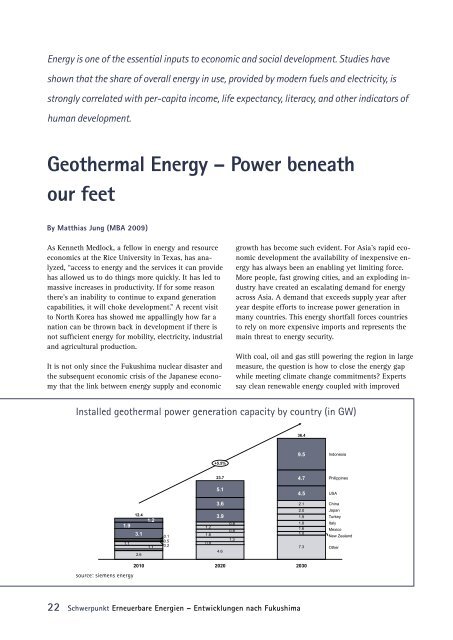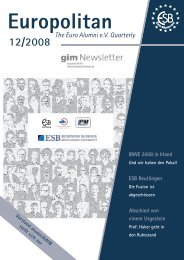Entwicklungen nach Fukushima - ESB-Radler
Entwicklungen nach Fukushima - ESB-Radler
Entwicklungen nach Fukushima - ESB-Radler
Erfolgreiche ePaper selbst erstellen
Machen Sie aus Ihren PDF Publikationen ein blätterbares Flipbook mit unserer einzigartigen Google optimierten e-Paper Software.
Energy is one of the essential inputs to economic and social development. Studies have<br />
shown that the share of overall energy in use, provided by modern fuels and electricity, is<br />
strongly correlated with per-capita income, life expectancy, literacy, and other indicators of<br />
human development.<br />
Geothermal Energy – Power beneath<br />
our feet<br />
By Matthias Jung (MBA 2009)<br />
As Kenneth Medlock, a fellow in energy and resource<br />
economics at the Rice University in Texas, has analyzed,<br />
“access to energy and the services it can provide<br />
has allowed us to do things more quickly. It has led to<br />
massive increases in productivity. If for some reason<br />
there’s an inability to continue to expand generation<br />
capabilities, it will choke development.” A recent visit<br />
to North Korea has showed me appallingly how far a<br />
nation can be thrown back in development if there is<br />
not sufficient energy for mobility, electricity, industrial<br />
and agricultural production.<br />
It is not only since the <strong>Fukushima</strong> nuclear disaster and<br />
the subsequent economic crisis of the Japanese economy<br />
that the link between energy supply and economic<br />
growth has become such evident. For Asia’s rapid economic<br />
development the availability of inexpensive energy<br />
has always been an enabling yet limiting force.<br />
More people, fast growing cities, and an exploding industry<br />
have created an escalating demand for energy<br />
across Asia. A demand that exceeds supply year after<br />
year despite efforts to increase power generation in<br />
many countries. This energy shortfall forces countries<br />
to rely on more expensive imports and represents the<br />
main threat to energy security.<br />
With coal, oil and gas still powering the region in large<br />
measure, the question is how to close the energy gap<br />
while meeting climate change commitments? Experts<br />
say clean renewable energy coupled with improved<br />
Installed geothermal power generation capacity by country (in GW)<br />
source: siemens energy<br />
22 Schwerpunkt Erneuerbare Energien – <strong>Entwicklungen</strong> <strong>nach</strong> <strong>Fukushima</strong>






